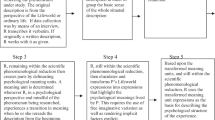Abstract
Psychology has not fully engaged with the possible reality of transcendence, spirit, or the divine, largely due to unexamined assumptions that prevent taking religious experience and transcendence seriously. Eugene Long’s reflections on experience and transcendence, key ideas from hermeneutic philosophy, including Brent Slife’s conception of “strong relationality,” Peter Berger’s analysis of modern dilemmas and “many realities,” Louis Dupré’s discussion of an ingrained “objectivism” that has long colored and probably distorted Western philosophy, theology, and the social sciences, and Vaclav Havel’s suggestion of a “need for transcendence” in a postmodern world roughly cohere and go a long way toward dismantling the “encapsulated self” that must either reject transcendence altogether or reach it only by way of a blind and indefensible “leap” out of the modern situation.
Similar content being viewed by others
Notes
Berger is careful to acknowledge the genuine insights conveyed by Kierkegaard and others who may have employed terminology of this sort. He indicates he is referring to a common, he feels inadequate, option adopted by many religious people trying to make sense of faith in a modern context.
References
Bakhtin, M. (1981). In M. Holquist (Ed.), The dialogical imagination: Four essays by M. M. Bakhtin. Austin: University of Texas Press.
Bellah, R., Madsen, R., Sullivan, W., Swindler, A., & Tipton, S. (1985). Habits of the heart: Individualism and community in American life. Berkeley: University of California Press.
Berger, P. (1977). Facing up to modernity. New York: Basic Books.
Berger, P. (1979). The heretical imperative. Garden City: Anchor Press/Doubleday.
Borg, M. (1997). The God we never knew: Beyond dogmatic religion to a more authentic faith. New York: HarperCollins.
Brooks, D. (2003, March). Kicking the secularist habit. The Atlantic Monthly, p. 26.
Cushman, P. (1990). Why the self is empty. American Psychologist, 45, 599–611.
Dunne, J. (1995). Beyond sovereignty and deconstruction: the storied self. Philosophy and Social Criticism, 21, 137–157.
Dupré, L. (1976). Transcendent selfhood: The rediscovery of the inner life. New York: Seabury Press.
Fowers, B. (2005). Virtue and psychology: Pursuing excellence in ordinary practices. Washington, D. C.: APA Press Books
Gadamer, H.-G. (1989). Truth and method, 2nd rev. ed. Trans. J. Weinsheimer & D. Marshall. New York: Crossroad.
Guignon, C. (1989). Truth as disclosure: art, language, history. Southern Journal of Philosophy, 28, 105–121.
Guignon, C. (1993). Overcoming dualism: a hermeneutic approach to understanding humans. Unpublished paper, University of Vermont.
Havel, V. (1985, March). Forgetting we are not God. First Things, 51, 47–50.
Heidegger, M. (1962). Being and time. New York: Harper & Row.
Long, E. (1998). Quest for transcendence. Review of Metaphysics, 52, 3–19.
Long, E. (2006). Suffering and transcendence. International Journal of the Philosophy of Religion, 60, 139–148.
Marcel, G. (1973). Tragic wisdom and beyond (trans: Jolin, S. and McCormick, P.). Evanston: Northwestern University Press.
Murdoch, I. (1970). The sovereignty of good. London: Routledge & Kegan Paul.
Richardson, F. (2005). Psychotherapy and modern dilemmas. In B. Slife, J. Reber, & F. Richardson (Eds.), Critical thinking about psychology: Hidden assumptions and plausible alternatives (pp. 17–38). Washington, DC: APA Books.
Richardson, F. (2012). On psychology and virtue ethics. Journal of Theoretical and Philosophical Psychology, 32, 24–34.
Richardson, F. & Bishop, R. (2002). Rethinking determinism in social science. In R. Bishop and H. Atmanspacher (Eds.), Between chance and choice: Interdisciplinary perspectives on determinism. Charlottesville, VA: Imprint Academic.
Richardson, F., & Fowers, B. (1998). Interpretive social science. American Behavioral Scientist, 41, 465–495.
Richardson, F., Fowers, B., & Guignon, C. (1999). Re-envisioning psychology: Moral dimensions of theory and practice. San Francisco: Jossey-Bass.
Shotter, J., & Billig, M. (1998). A Bakhtinian psychology: From out of the heads of individuals and into the dialogues between them. In M. Bell & M. Gardiner (Eds.), Bakhtin and the human sciences: No last words (pp. 13–29). London: Sage Publications.
Slife, B. (2004). Taking practices seriously: toward a relational ontology. Journal of Theoretical and Philosophical Psychology, 24, 179–195.
Smith, R. (1969). The free man. London: Collins.
Taylor, C. (1985). Human agency and language: Philosophical papers (Vol. 1). Cambridge: Cambridge University Press.
Taylor, C. (1988). The moral topography of the self. In S. Messer, L. Sass, & R. Woolfolk (Eds.), Hermeneutics and psychological theory: Interpretive perspectives on personality, psychotherapy, and psychopathology (pp. 298–320). New Brunswick: Rutgers University Press.
Taylor, C. (1989). Sources of the self. Cambridge: Harvard University Press.
Taylor, C. (1991). The dialogical self. In J. Bohman, D. Hiley, & R. Schusterman (Eds.), The interpretive turn (pp. 304–314). Ithaca: Cornell University Press.
Taylor, C. (1993). Engaged agency and background in Heidegger. In C. Guignon (Ed.), The Cambridge companion to Heidegger (pp. 317–336). Cambridge: Cambridge University Press.
Warnke, G. (1987). Gadamer: Hermeneutics, tradition, and reason. Stanford: Stanford University Press.
Author information
Authors and Affiliations
Corresponding author
Rights and permissions
About this article
Cite this article
Richardson, F.C. Investigating Psychology and Transcendence. Pastoral Psychol 63, 355–365 (2014). https://doi.org/10.1007/s11089-013-0536-6
Published:
Issue Date:
DOI: https://doi.org/10.1007/s11089-013-0536-6




